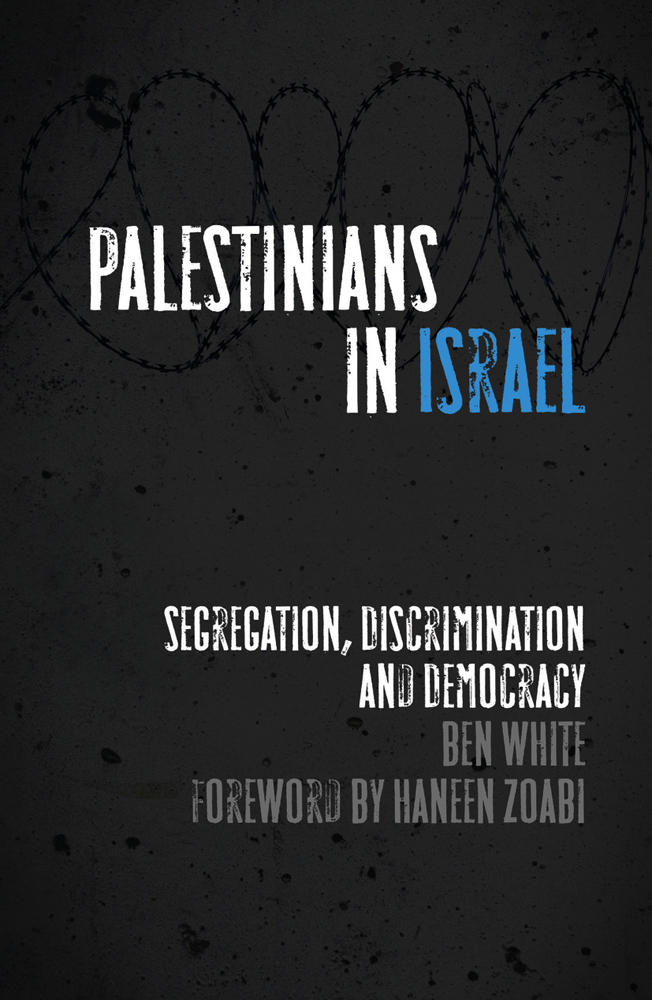Ben White’s insightful analysis of the Palestinian people’s plight in Israel depicts politics based on racism, a split between citizens and nationals and a deep insight into repetitive stereotypes which serve to instil a false depiction of cultural traditions against a backdrop of Jewish superiority.
Despite the acquisition of Israeli citizenship by Palestinians living in Israel, Zionist politics have allowed room for political manoeuvre by distinguishing between citizenship and nationality, thus rendering Palestinians living in the occupied land second-class citizens. Israel demands that Palestinians living in the occupied territories recognize a Jewish state, yet the state denies political participation of Palestinians. Zionists claim historical right to Palestinian land whilst only granting conditional rights in the land to Palestinians. This divide strengthens Zionist politics, reiterating that the state of Israel is responsible for the cultural identity of Jews around the world.
Since Jewish Law is derived from ethnic and theocratic criteria, Israel has effectively created an apartheid which sustains land acquisition, displacement and racism. Following the limits of expansion in illegal Israeli settlements, the Jewish state shifted its focus to apartheid. Occupied Palestinian territory became a site of struggle between racist occupiers and the indigenous population. Whilst the “Law of Return” granted Jews both citizenship and residence, Palestinians forcibly displaced in the Nakba were ineligible. In subsequent legislation to retain forcibly taken land, Palestinians who fled the massacre between 1947 and 1948 were ineligible to claim land rights.
The forced displacement affected Bedouin communities, which were transferred into a reservation with other tribes. This time, Israel relied upon vestiges of Ottoman law which defined Bedouin land as “uncultivated and classified under state ownership.” Bedouins were categorized by Moshe Shohat (2001) as “bloodthirsty people who commit polygamy, have 30 children and continue to expand their illegal settlements by taking over state lands.”
Given the Knesset’s demand that “the Jewish state must be preserved,” Palestinians living in Israel are targeted with state violence and repression. Many Palestinians are living in unrecognised villages, risking home demolition, denying people to remove their belongings before demolition and destruction of fertile land. These villages are not catered for by the Israeli government, claiming that providing basic services to a small population would be extremely expensive. Government budget allocation for Palestinians in Israel is a mere four per cent for 20 per cent of the population. Israeli law can interfere to break up intermarriage between Jews and Palestinians. Military trials are held for civilians overstepping geographical boundaries. Activists are routinely exiled from unrecognized villages. Any violence against Palestinians, including massacres, is commended by the government and depicted as “restraint in handling disturbances.”
White depicts the racism against Palestinians by a series of quotes from Israeli members of government, illustrating how Zionist politics are incompatible with democracy, despite the rhetoric by Israel and its Western allies. In 2009, freedom of religion in Nazareth was threatened, with the Mayor declaring that non-Jewish symbols should be abolished and referring to the adhan (Muslim call to prayer) as “a provocation” and “the noise from the mosques.” In 2003, Dr Yitzhak Ravid described hospitals as “a factory for the production of a backward population.”
The politics of racism and apartheid have gained ground within the Israeli population, with polls showing substantial percentages of Jewish Israelis opposing Palestinian participation in politics, favouring the emigration of Palestinians, revoking voting rights and considering intermarriage as tantamount to treason.
Palestinians in Israel: Segregation, Discrimination and Democracy permanently dispels the myth of a democratic state of Israel. By flaunting the hypocrisy and state violence of Zionist politics in Israeli Occupied Territories, White reinvents the discourse of the Palestinians’ plight, presenting the facade of what Israel and Western allies define as democracy — state sanctioned apartheid policies which deter any possibility of peace process. Lurking beneath the turmoil in the occupied territories is the rhetoric of human rights and the significant leniency in allowing the Jewish government to continue with its policy of persecution.—Ramona Wadi
Ramona Wadi is a freelance writer and book reviewer. Her articles, interviews and book reviews have been published in Upside Down World, LSE Politics and Policy, Toward Freedom, and Irish Left Review.



